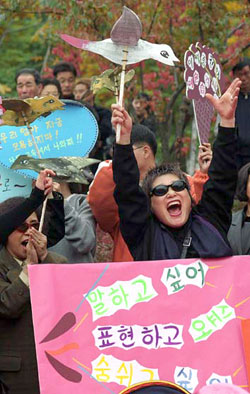
Eight members of the feminist artist group 'Ibgim' who had planned the art event filed a lawsuit against the Yi clan, claiming 40 million Won in damages. But the feminist lost the first round to the confucianists when Judge Lee Young-han of the Seoul District Court dismissed the case on September 17, 2002 saying, "The damage claim would hold if the Yi clan had taken illegal action, but there is insufficient evidence to that effect."
Nine months later on June 3 this year, the feminists won the second trial at Court 455 of the Seoul District Court, where part of the court decision of the first trial was overruled. The "insufficient evidence of illegal action by the Yi clan" that the judge sited during the first trial was shot down when a video tape of the Yi clan's rampage was accepted as court evidence and screened before a panel of four judges during the second trial. The Yi clan had insisted that none of its members had gone to the event and had denied any knowledge of illegal acts, but the video tape proved that the clan had organized its members to "crash" the event.
Feminist photographer Park Young-sook comments, "The court case shows the patriarchal and male-chauvinist nature of the Korean cultural environment, where a purely cultural event can be turned into a social controversy. The court decision was only too right, and it will be like a breath of fresh air as it has set a good, albeit belated, precedent in moving towards a mature society."

